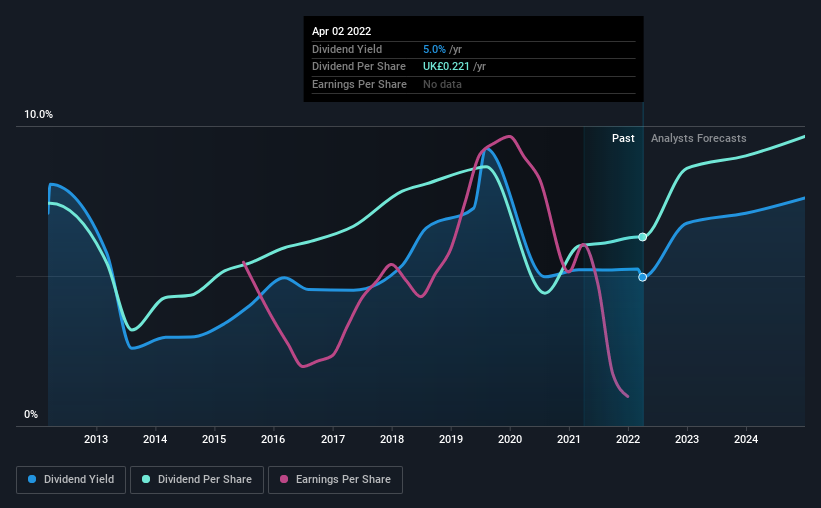
Aviva plc's (LON:AV.) dividend will be increasing to UK£0.15 on 19th of May. This takes the annual payment to 5.0% of the current stock price, which is about average for the industry.
View our latest analysis for Aviva
Aviva's Dividend Is Well Covered By Earnings
Unless the payments are sustainable, the dividend yield doesn't mean too much. Based on the last payment, the company wasn't making enough to cover what it was paying to shareholders. Without profits and cash flows increasing, it would be difficult for the company to continue paying the dividend at this level.
Analysts expect a massive rise in earnings per share in the next year. If the dividend continues along recent trends, we estimate the payout ratio will be 52%, which would make us comfortable with the dividend's sustainability, despite the levels currently being elevated.

Dividend Volatility
Although the company has a long dividend history, it has been cut at least once in the last 10 years. Since 2012, the first annual payment was UK£0.26, compared to the most recent full-year payment of UK£0.22. This works out to be a decline of approximately 1.6% per year over that time. Generally, we don't like to see a dividend that has been declining over time as this can degrade shareholders' returns and indicate that the company may be running into problems.
The Dividend Has Limited Growth Potential
Growing earnings per share could be a mitigating factor when considering the past fluctuations in the dividend. Aviva's earnings per share has shrunk at 15% a year over the past five years. A sharp decline in earnings per share is not great from from a dividend perspective. Even conservative payout ratios can come under pressure if earnings fall far enough. However, the next year is actually looking up, with earnings set to rise. We would just wait until it becomes a pattern before getting too excited.
We're Not Big Fans Of Aviva's Dividend
Overall, while the dividend being raised can be good, there are some concerns about its long term sustainability. The company's earnings aren't high enough to be making such big distributions, and it isn't backed up by strong growth or consistency either. Overall, the dividend is not reliable enough to make this a good income stock.
Companies possessing a stable dividend policy will likely enjoy greater investor interest than those suffering from a more inconsistent approach. Still, investors need to consider a host of other factors, apart from dividend payments, when analysing a company. Just as an example, we've come across 3 warning signs for Aviva you should be aware of, and 1 of them is a bit concerning. Looking for more high-yielding dividend ideas? Try our collection of strong dividend payers.
New: Manage All Your Stock Portfolios in One Place
We've created the ultimate portfolio companion for stock investors, and it's free.
• Connect an unlimited number of Portfolios and see your total in one currency
• Be alerted to new Warning Signs or Risks via email or mobile
• Track the Fair Value of your stocks
Have feedback on this article? Concerned about the content? Get in touch with us directly. Alternatively, email editorial-team (at) simplywallst.com.
This article by Simply Wall St is general in nature. We provide commentary based on historical data and analyst forecasts only using an unbiased methodology and our articles are not intended to be financial advice. It does not constitute a recommendation to buy or sell any stock, and does not take account of your objectives, or your financial situation. We aim to bring you long-term focused analysis driven by fundamental data. Note that our analysis may not factor in the latest price-sensitive company announcements or qualitative material. Simply Wall St has no position in any stocks mentioned.
About LSE:AV.
Aviva
Provides various insurance, retirement, and wealth products in the United Kingdom, Ireland, Canada, and internationally.
Adequate balance sheet average dividend payer.
Similar Companies
Market Insights
Community Narratives



